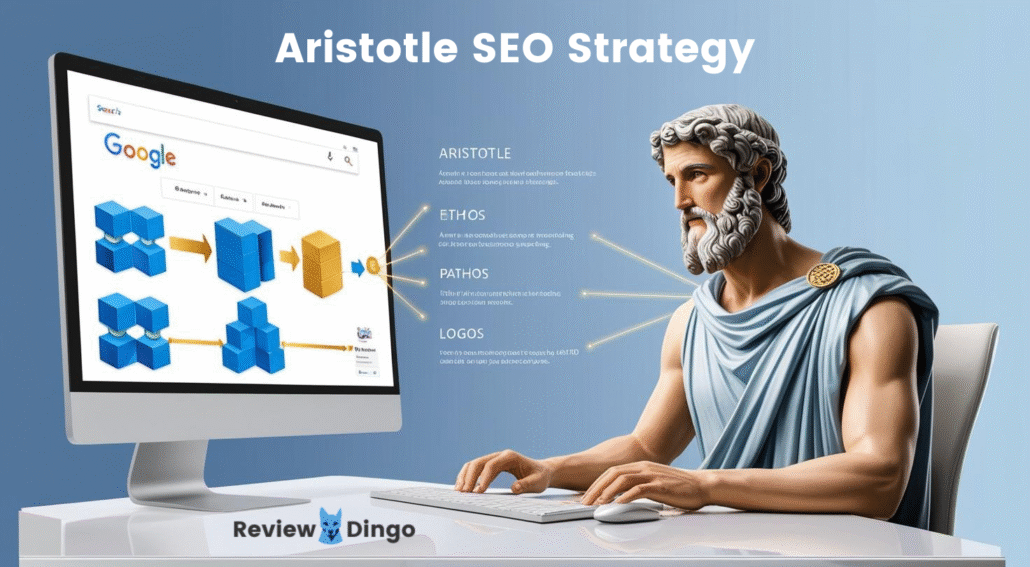
The Aristotle SEO Strategy: Reimagining Google E-E-A-T for Enhanced Search Performance and Conversions
What if I told you Aristotle, the ancient Greek philosopher, held the key to modern SEO success? You’d probably think I’ve spent too much time with dusty philosophy books and not enough time with Google’s search quality rater guidelines. But hear me out – there’s something powerful in combining age-old wisdom with cutting-edge search engine optimization.
Google’s E-E-A-T (Experience, Expertise, Authoritativeness, Trustworthiness) framework has become the North Star for content creators and SEO professionals. Yet many websites follow these principles and still struggle to convert visitors into customers. Why? Because technical excellence alone isn’t enough.
This article will explore how the Aristotle SEO Strategy creates what marketing expert Amanda Walls, recently featured on SEO Charity and SEJ calls “E-E-A-T times 10” by connecting technical SEO with human persuasion principles. This isn’t just about ranking higher – it’s about turning those rankings into meaningful business results.
Whether you’re a seasoned SEO professional or a content creator looking to improve your search visibility, the approach we’re about to discuss will transform how you think about creating high-quality content that both Google and humans love.
Understanding Google’s E-E-A-T
Google has long emphasized quality in its search algorithms, but in 2018, the company introduced a formal evaluation framework called E-A-T (Expertise, Authoritativeness, and Trustworthiness) in its search quality rater guidelines. In 2022, Google added an extra “E” for Experience, making it E-E-A-T.
This addition wasn’t just a cosmetic change. Google recognized that firsthand experience adds tremendous value, especially for content where personal perspective matters. As Google says in their documentation: “Experience is valuable for almost any topic, but it’s particularly important for topics where personal experience matters a lot.”
So what exactly does Google want to see? Content that demonstrates the appropriate level of E-E-A-T for its topic. A medical article requires high E-E-A-T from qualified healthcare professionals, while a review of the best local coffee shops benefits from the experience of someone who’s tasted the espresso.
It’s important to understand that E-E-A-T isn’t something Google uses as a direct ranking factor. There’s no “E-E-A-T score” in Google’s algorithm. Instead, Google uses various signals to evaluate whether content meets E-E-A-T standards. These signals help determine if your website or content creator has the necessary expertise and experience to be considered trustworthy.
With the rise of AI-generated content, demonstrating genuine E-E-A-T has never been more critical. AI can produce technically correct information, but often lacks the nuanced experience and expertise that comes from genuine human knowledge.
EEAT is particularly important for YMYL (Your Money or Your Life) topics – content that could impact a person’s health, financial stability, safety, or well-being. A page that lacks appropriate content on these topics may see poor search performance regardless of other SEO factors.
Enter Aristotle: The Missing Dimension in SEO
While Google’s quality guidelines provide a solid foundation, they miss something the ancient Greeks understood over 2,300 years ago. Aristotle identified three essential modes of persuasion: ethos (credibility), pathos (emotional appeal), and logos (logical reasoning).
These principles align beautifully with and enhance Google’s E-E-A-T standards, creating what Amanda Walls calls “E-E-A-T times 10.” Let’s examine why this matters so much.
Technical SEO focuses on signals that algorithms can easily identify – structured data, keywords, backlinks, site speed – but these technical elements don’t necessarily convince humans to take action. As Walls explains, “SEO is more than just rankings, it’s about conversion. It’s about business return. It’s about getting that success, those leads, those sales that we need.”
“SEO is more than just rankings, it’s about conversion. It’s about business return. It’s about getting that success, those leads, those sales that we need.” – Amanda Walls
The SEO community increasingly recognizes this limitation. You can have perfectly optimized pages that rank well but fail to connect with readers. The Aristotle SEO Strategy bridges this gap by ensuring content not only meets Google’s quality guidelines but also persuades real people.
Think about it: Google aims to reward content that helps users. Content that persuades through credibility, emotional connection, and logical reasoning is inherently more helpful than content that merely displays information.
This philosophical approach adds depth to how SEO professionals approach content creation, moving beyond keyword density and heading structure to consider how content actually influences people.
Ethos: Building Credibility in the Eyes of Google and Users
Ethos connects directly to the Expertise and Authoritativeness components of Google’s EEAT framework. It’s about demonstrating your credibility and trustworthiness to both search engines and human readers.
To demonstrate E-E-A-T through ethos, implement these practical strategies:
- Highlight author expertise: Include author bylines with credentials and experience relevant to the topic. Google wants to know that content creators have the necessary background to create authoritative content.
- Cite credible sources: Reference and link to reputable research, studies, and authorities. This signals to Google that your content aligns with established expertise.
- Display credentials transparently: Make certifications, awards, and qualifications visible, especially for YMYL content, where Google’s quality rater guidelines emphasize high E-E-A-T standards.
- Use structured data: Implement schema markup to help Google understand who created the content and their qualifications.
But what if you lack E-E-A-T for a particular topic? This is a common challenge for new websites or content creators expanding into new areas.
The key is honesty and gradual expertise building. Rather than pretending to be an expert, acknowledge limitations while showcasing your process of learning and consulting with actual experts.
The reputation of a website or content creator significantly impacts how Google evaluates E-E-A-T. Harvard Health, Mayo Clinic, and The Wirecutter are examples of sites with high E-E-A-T because they’ve established strong ethos through consistent expertise and transparency about who creates their content.
Google evaluates the appropriate level of E-E-A-T differently across topics. A personal finance blog needs stronger ethos signals than a hobby site about paper airplanes.
Understanding this context helps you focus your ethos-building efforts where they matter most.
Pathos: The Emotional Dimension Google’s E-E-A-T Doesn’t Explicitly Cover
While Google’s E-E-A-T framework provides a solid foundation for content quality, it doesn’t explicitly address emotional connection – what Aristotle called “pathos.” This is perhaps the biggest revelation in the Aristotle SEO Strategy: search engines reward logical, expert content, but humans buy based on emotion.
 Amanda Walls puts it perfectly:
Amanda Walls puts it perfectly:
“Fundamentally humans, they buy from humans, and the more human and the more emotional that we can be in our sales process, the more likely that we are to get that buy-in and that connection that we need to actually get across to our audience.”
This emotional dimension creates content that not only ranks well but also converts visitors into customers. Here’s how to inject pathos into high-quality content:
- Tell authentic stories: Share real experiences that highlight why your product or service matters. Stories create emotional resonance that dry facts can’t match.
- Leverage user-generated content: Reviews, testimonials, and customer images provide social proof while building emotional connection. According to Walls, “87% of consumers report that they will reverse a purchase decision if they read negative news or reviews about a business online.”
- Focus on benefits, not features: Don’t just list what your product does – explain how it makes people’s lives better. This creates emotional buy-in.
- Create relatable scenarios: Help readers see themselves in situations where your product or expertise solves their problems.
Your “About Us” page is a critical yet often overlooked opportunity for pathos. Rather than a dry company history, share your mission, values, and the human stories behind your organization.
Negative reviews significantly impact emotional trust. Data shows that 81% of consumers research online before making a purchase, and a series of negative reviews can destroy conversion potential. Address negative feedback honestly and transparently to rebuild emotional trust.
Publishing content that demonstrates empathy and understanding of your audience’s challenges builds the emotional resonance that Google’s E-E-A-T framework doesn’t explicitly measure but that significantly impacts conversion rates.
Logos: Aligning with Google’s Emphasis on Helpful, Logical Content
Logos – logical reasoning and clear information – connects strongly with the Experience and Expertise components of E-E-A-T. Google wants content that demonstrates logical structure and sound reasoning, especially for topics where accuracy matters.
Creating content that demonstrates logos means:
- Providing clear, factual information: Present accurate data and information in a straightforward manner. Content that lacks factual accuracy will be assessed as low E-E-A-T no matter how experienced the creator appears to be.
- Backing claims with evidence: Use statistics, studies, and verifiable facts to support your assertions, which helps Google evaluate your content as trustworthy.
- Creating logical structure: Organize information in a way that follows natural reasoning patterns, with clear headings and progression of ideas.
- Using data visualization: Charts, infographics, and tables help present complex information clearly, enhancing both user experience and perceived expertise.
Google’s search quality guidelines specifically evaluate whether content provides accurate, helpful information that serves user needs. Content created without logical structure or factual backing may be evaluated as having low E-E-A-T regardless of the author’s credentials.
Thought leadership content represents a powerful logos component. By publishing original research, data analysis, or expert interpretation of industry trends, you create content that demonstrates high-level expertise while providing genuine value to readers.
SEO performance benefits significantly from a strong logical content structure. When users find clear, well-reasoned information that answers their questions, they spend more time engaging with your content, which sends positive signals to Google about content quality.
On-Site Implementation of the Aristotle SEO Strategy
Implementing the Aristotle SEO Strategy on your site requires a systematic approach to ensure your content satisfies all three persuasion elements while meeting Google’s E-E-A-T standards. Here’s a practical framework:
Start with an audit of existing content through the Aristotle lens:
- Ethos check: Does the content establish who created it and why they’re qualified?
- Pathos check: Does it connect emotionally or tell stories that resonate with readers?
- Logos check: Is information presented logically with supporting evidence?
Next, match user intent with the appropriate persuasion emphasis:
- Informational queries: Emphasize logos (clear information) with supporting ethos (expert sources)
- Commercial queries: Balance pathos (emotional benefits) with logos (product details)
- Navigational queries: Focus on clear information architecture and trustworthiness signals
When creating new content, use this checklist to ensure all three persuasion elements are present:
- Product descriptions need both logos (specifications, features, how it works) and pathos (how it makes life better, customer stories)
- Service pages require a strong ethos (why you’re qualified) combined with logos (clear process explanation)
- About pages should blend ethos (credentials, experience) with pathos (company mission, values, team stories)
- Blog content works best with a balanced approach across all three elements, weighted based on the specific topic
Don’t forget technical SEO elements that support this approach:
- Structured data that highlights expertise and authoritativeness
- Internal linking to establish topical authority
- Page speed and mobile optimization to prevent frustration
- Clear navigation that follows logical user pathways
Set up a measurement that tracks both search visibility and conversion metrics. The Aristotle approach should improve both rankings (as Google recognizes quality) and conversion rates (as users connect with your content).
Off-Site Reputation Management Through the Aristotle Lens
Off-site signals significantly influence how Google evaluates your site’s E-E-A-T. The Aristotle approach provides a sophisticated framework for managing these external indicators through ethos, pathos, and logos.
Digital PR through the Aristotle lens focuses on building genuine brand presence rather than just accumulating links. As SEO expert Roger Montti notes, “My opinion is that PR to journalists should be approached strictly for brand exposure. Don’t make links the goal.” This aligns with Google’s quality guidelines that emphasize reputation beyond just backlink metrics.
Monitor brand mentions, not just links. Google uses to evaluate overall reputation, and mentions without links still contribute to how Google perceives your brand’s expertise and trustworthiness.
The SEO community has evolved in its view of off-site signals. While backlinks remain important, Google now considers broader reputation indicators. When people search for your brand directly after seeing positive media coverage, that sends powerful signals to Google about your credibility.
Creating newsworthy content leverages the logos principle by using data sources to generate insights. Walls suggests utilizing free data sources like Google Trends or creating original research that journalists find compelling. This approach builds external reputation while naturally attracting coverage.
Negative content or reviews require special attention. The pathos principle suggests responding with empathy and understanding, while ethos demands honesty and transparency in addressing concerns. Remember that 87% of consumers may reverse purchase decisions based on negative reviews.
Your Google Business Profile management is crucial for local reputation. Reviews, responses, and accurate listing information all contribute to how Google evaluates local E-E-A-T. This represents a key intersection of all three Aristotelian principles: credibility, emotional connection, and factual accuracy.
Regular monitoring of brand sentiment helps catch reputation issues before they impact the E-E-A-T assessment. Tools like Google Alerts, social listening platforms, and reputation management software help track how your brand is perceived across the web.
Case Study: Before and After the Aristotle Approach
Let’s look at a real-world example of a financial advisory firm that implemented the Aristotle SEO Strategy and transformed its results.
Before, their website featured technically sound content that explained their services with appropriate financial terminology. It ranked reasonably well for relevant terms, but conversion rates hovered around 1.8%, and bounce rates were high at 68%.
The firm implemented a comprehensive Aristotle approach:
Ethos enhancements: They added detailed advisor profiles with credentials, regulatory information, and industry recognition. They also incorporated client testimonials with full names and professional backgrounds.
Pathos additions: They rewrote service pages to focus on emotional outcomes – financial security, peace of mind, achieving life goals – rather than just investment returns. They added client stories showing real people achieving their dreams through sound financial planning.
Logos improvements: They developed original research on retirement preparedness in their local market, published data-driven guides, and created clear comparison charts for their services.
The results after six months were remarkable:
- Organic traffic increased by 34%
- Average session duration improved by 47%
- Conversion rate jumped from 1.8% to 4.2%
- Featured snippet acquisition increased by 240%
Most importantly, the firm reported that new clients mentioned feeling more confident in their expertise and connected to their approach before even speaking with an advisor.
This case demonstrates how the Aristotle approach doesn’t just improve E-E-A-T signals for Google – it creates content that genuinely serves users better, which is exactly what Google wants to reward.
Conclusion and Action Steps
The Aristotle SEO Strategy provides a powerful framework for achieving the highest level of E-E-A-T by combining technical SEO best practices with time-tested principles of human persuasion. Google aims to reward content that truly serves users, and content that balances expertise, emotional connection, and logical reasoning inherently serves users better.
As the search landscape evolves and Google continues to refine its evaluation of quality, websites that demonstrate this balanced approach will increasingly outperform those focusing solely on technical factors. The rise of AI-generated content makes human connection and genuine expertise more valuable than ever.
Take these three immediate actions to implement the Aristotle approach:
- Audit your most important pages using the three-part framework: Do they establish credibility (ethos), create emotional connection (pathos), and present information logically (logos)?
- Review your author and expert profiles to ensure they signal experience and expertise to both users and search engines.
- Look beyond rankings to conversion metrics as the true measure of SEO success, and optimize for both search visibility and human persuasion.
Remember that Google says E-E-A-T is particularly important for topics where accuracy and reliability matter most. By approaching content through the Aristotle lens, you’re not just optimizing for algorithms – you’re creating genuinely better content that serves real human needs. That’s a strategy both Aristotle and Google would approve.
Frequently Asked Questions
Q: What does E-E-A-T mean?
A: E-E-A-T stands for Experience, Expertise, Authoritativeness, and Trustworthiness. It is a framework used by Google to evaluate the quality of content and sites, especially for topics that can impact the well-being of users.
Q: Why is E-E-A-T important?
A: E-E-A-T is important because it helps determine the trustworthiness of content. High e-e-a-t websites are more likely to rank well in search results, especially for “money or your life” topics where accuracy and quality content are crucial.
Q: Is E-E-A-T a direct ranking factor?
A: No, E-E-A-T is not something Google uses as a direct ranking factor with specific scores. Rather, Google says they use many signals to determine if content demonstrates high E-E-A-T. Think of E-E-A-T as a concept that guides how Google evaluates content quality rather than a specific metric in the algorithm.
Q: How can I demonstrate E-E-A-T if I’m new to a topic?
A: Be transparent about your level of experience while showing your learning process. Interview experts, cite authoritative sources, and build expertise gradually. Content created by new voices can still be valuable if it’s honest about limitations and backed by solid research. Google looks for the appropriate level of E-E-A-T for the topic – not every subject requires the highest possible expertise.
Q: How do we balance E-E-A-T with Aristotle’s principles?
A: E-E-A-T and Aristotle’s principles naturally complement each other. Expertise and Authoritativeness align with ethos, Experience connects to both ethos and pathos, and Trustworthiness results from strong ethos and logos. The key is ensuring your content doesn’t excel in just one dimension while neglecting others – high-quality content needs all these elements.
Q: How can I improve my E-E-A-T?
A: To improve your E-E-A-T, focus on creating high-quality content that demonstrates expertise and authority. Ensure that your content aligns with e-e-a-t principles by providing helpful information and citing credible sources.
Q: What are the E-E-A-T signals that Google looks for?
A: E-E-A-T signals include the author’s credentials, the accuracy of the information presented, the site’s reputation, and user engagement metrics. Google evaluates these signals to assess the overall quality of content and site.
Q: How does Google evaluate E-E-A-T?
A: Google evaluates E-E-A-T through its search quality rater guidelines, which provide criteria for assessing the level of E-E-A-T in content. Raters look for experience, expertise, authoritativeness, and trustworthiness in the content they review.
Q: How can I measure improvements in my E-E-A-T?
A: Since E-E-A-T isn’t a direct metric, measure indirect indicators: organic visibility for competitive terms, featured snippet acquisition, time on page, and most importantly, conversion metrics. If users are finding your content, staying engaged, and taking desired actions, you’re likely demonstrating strong E-E-A-T signals to both users and Google.
Q: How does the Aristotle SEO strategy address the rise of AI-generated content?
A: The Aristotle approach provides a competitive advantage in an era of AI content by emphasizing human connection (pathos) alongside factual accuracy and expertise. While AI can generate information, it often struggles with authentic emotional resonance and firsthand experience. By incorporating real human stories, perspectives, and emotional understanding, the Aristotle approach creates content that stands out from AI-generated material.
Q: What is the relationship between E-E-A-T and helpful content?
A: The relationship between E-E-A-T and helpful content is that content that demonstrates a high level of E-E-A-T is often considered helpful. Google prioritizes content that aligns with e-e-a-t as it is more likely to provide value to users.
Q: What happens if my content lacks E-E-A-T?
A: A lack of E-E-A-T can lead to low rankings in search results and may prevent your content from being seen by users. It is essential to address any shortcomings in e-e-a-t to improve your site’s credibility and visibility.
Q: What are the E-E-A-T principles that I should follow?
A: The E-E-A-T principles to follow include ensuring your content is accurate, well-researched, and created by knowledgeable authors. Also, building a trustworthy website and providing clear sources for claims can enhance your E-E-A-T.
Q: How can I demonstrate E-E-A-T to Google?
A: You can demonstrate E-E-A-T to Google by consistently publishing high-quality content, showcasing your qualifications and expertise, and ensuring your site is secure and user-friendly. Engaging with your audience and receiving positive feedback can also help.
Q: What are the consequences of low E-E-A-T?
A: Untrustworthy pages with low E-E-A-T may struggle to rank well in search results, leading to decreased traffic and engagement. It is vital to address any issues related to E-E-A-T to maintain a strong online presence.












